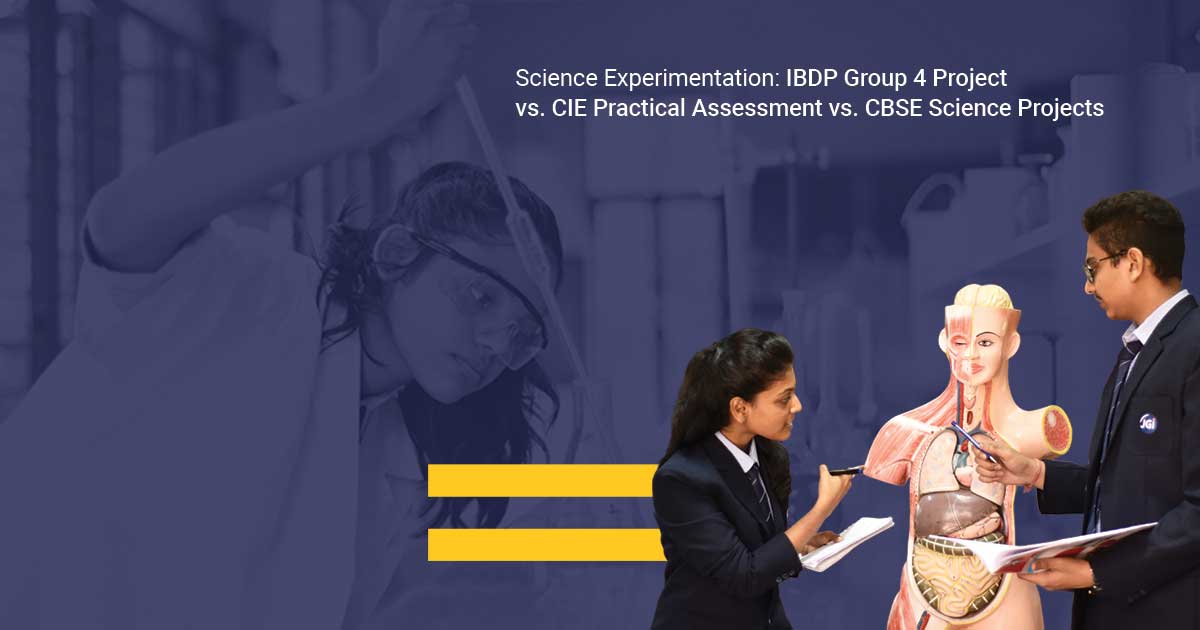

Conducting experiments and testing theories are integral to understanding scientific principles and understanding their applications. IBDP and CIE stress immensely upon the practical application of science and scientific investigations. The curriculum includes setting and conducting experiments, writing research papers, and creating case studies to explore and test theories. CBSE also has practical components in the syllabus in the form of lab experiments and projects. Science experiments can be Investigative Projects, Research Projects, Demonstration Projects, Models and Collections.
Understanding IBDP Group 4 Project
The Group 4 project in IBDP programme is a collaborative activity in which students from different Group 4 subjects work together on a scientific or technological topic. It is designed to encourage interdisciplinary investigations of scientific principles and understand the relationship between different scientific disciplines and the overarching nature of the scientific method. These projects can be theory or practical-based. Students can consider the global, environmental, social, and ethical implications of science and technology.
There are three stages to a Group 4 project – planning, action and evaluation divided across a 10-hour duration. The planning phase will have 1-2 sessions where the group will discuss the topic, share ideas, and conduct the activity. In the action phase, the students will investigate the topic, collaborate, and share their findings. In the evaluation phase, there will be a symposium or science fair where all groups will present their investigation reports.
Understanding CIE Practical Assessment
Under CIE curriculum, there are separate practical assessments for Physics, Chemistry and Biology, which are the core Science subjects offered by the board. The practical assessments will include laboratory experiments and practical investigations. Students will plan, set up and conduct the experiments, collect and analyse data, draw conclusions, answer questions and submit lab reports. Students’ skills such as setting up laboratory equipment, drawing diagrams and graphs, and taking measurements will be assessed.
In Physics, practical assessments have experiments in areas such as electricity, optics, and mechanics among others. In chemistry, there will be experiments for testing chemical reactions and performing titrations. In Biology, practical assessment topics are in anatomy, genetics, physiology, and ecology. The assessments may require students to dissect specimens and conduct field research.
Understanding CBSE Science Projects
CBSE science projects for PUC include conducting practical experiments to enhance the student’s understanding of scientific concepts and develop critical thinking and problem-solving skills. Science projects can be done in Chemistry, Physics, Biology, or a combination of the multiple scientific disciplines. Students may be assigned project topics or teachers may specify requirements or give recommendations. Students will be assessed for their understanding of scientific concepts, research and presentation skills, and documentation of the project.
IBDP vs. CIE vs. CBSE
The three education boards have different curriculums, assessment criteria, and formats. In IBDP, the Group 4 Project is integrated into the curriculum, and CIE and CBSE practical assessments are conducted in a laboratory setting. Student assessment criteria will include preparing lab records, viva voce, written exams, data collection and analysis, and presentation.
IBDP’s Science programme is more practical and project-based, so there is the same weightage for theory papers and practical work such as projects and lab experiments. The problems are designed to study the real-life application, global implications, and interdisciplinary scope.
For CBSE curriculum, the greater emphasis is on theory and understanding of the concepts. Students pick problems that test theories and develop a deeper understanding of the concepts they are learning in the classroom. In CIE, they assess practical skills and knowledge of Science subjects like CBSE, however, the content differs.
Both IBDP and CIE give equal weightage to Science, Mathematics, Language and Humanities. Thus, if your project tackles problems that can touch upon different subjects and have a wider perspective, then you will perform well.
Recent Blogs
IGCSE Full Form
What is the International Baccalaureate?
IBDP Full Form
CIE Board Full Form
CBSE Full Form
Site Designed and Maintained By : Office of Communications, JAIN Group All rights reserved.